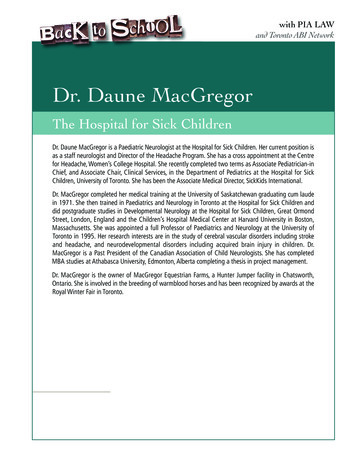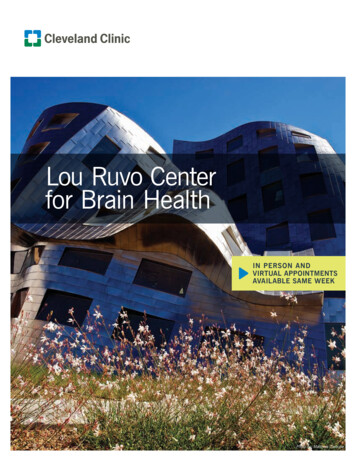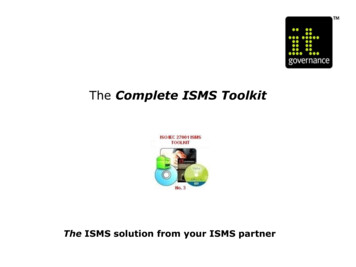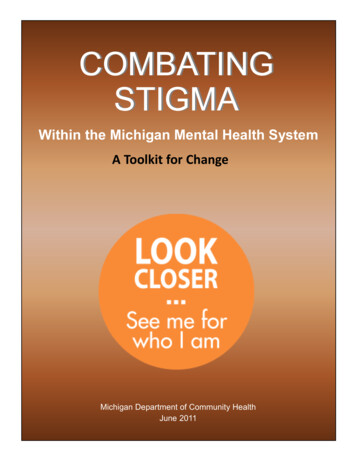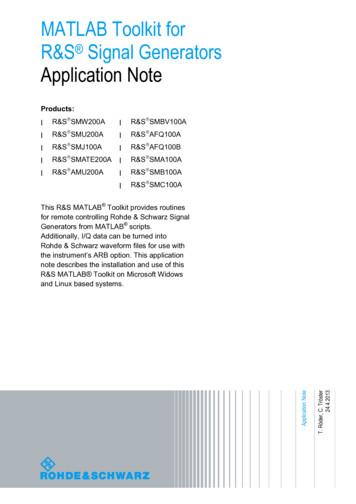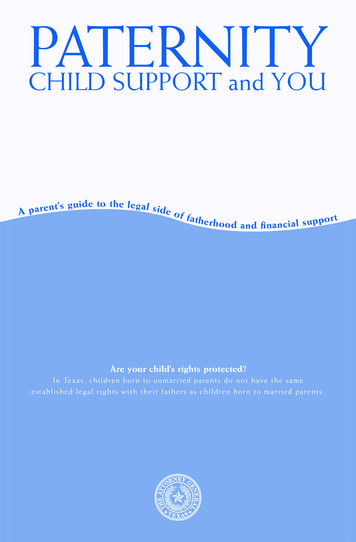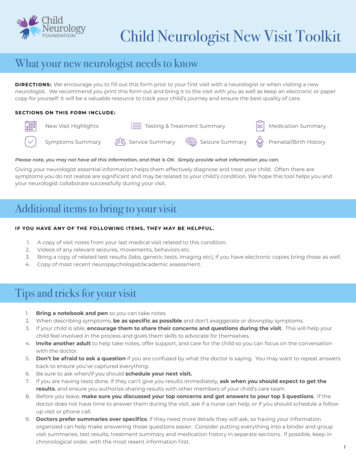
Transcription
Child Neurologist New Visit ToolkitWhat your new neurologist needs to knowDIRECTI O NS: We encourage you to fill out this form prior to your first visit with a neurologist or when visiting a newneurologist. We recommend you print this form out and bring it to the visit with you as well as keep an electronic or papercopy for yourself. It will be a valuable resource to track your child’s journey and ensure the best quality of care.S ECTIONS ON THI S FO R M I N CLU DE:calendarcheckNew Visit HighlightsSymptoms Summarylist Testing & Treatment Summaryusergroup Service SummarySeizure Summaryclipboard Medication Summarybaby Prenatal/Birth HistoryPlease note, you may not have all this information, and that is OK. Simply provide what information you can.Giving your neurologist essential information helps them effectively diagnose and treat your child. Often there aresymptoms you do not realize are significant and may be related to your child’s condition. We hope this tool helps you andyour neurologist collaborate successfully during your visit.Additional items to bring to your visitIF YOU HAVE ANY OF T H E FOL LOWI N G I T E MS , T H EY M AY B E H E L PFU L .1.2.3.4.A copy of visit notes from your last medical visit related to this condition.Videos of any relevant seizures, movements, behaviors etc.Bring a copy of related test results (labs, genetic tests, imaging etc), if you have electronic copies bring those as well.Copy of most recent neuropsychologist/academic assessment.Tips and tricks for your visit1.2.3.4.5.6.7.8.9.Bring a notebook and pen so you can take notesWhen describing symptoms, be as specific as possible and don’t exaggerate or downplay symptoms.If your child is able, encourage them to share their concerns and questions during the visit. This will help yourchild feel involved in the process and gives them skills to advocate for themselves.Invite another adult to help take notes, offer support, and care for the child so you can focus on the conversationwith the doctor.Don’t be afraid to ask a question if you are confused by what the doctor is saying. You may want to repeat answersback to ensure you’ve captured everything.Be sure to ask when/if you should schedule your next visit.If you are having tests done, if they can’t give you results immediately, ask when you should expect to get theresults, and ensure you authorize sharing results with other members of your child’s care team.Before you leave, make sure you discussed your top concerns and got answers to your top 3 questions. If thedoctor does not have time to answer them during the visit, ask if a nurse can help, or if you should schedule a followup visit or phone call.Doctors prefer summaries over specifics, if they need more details they will ask, so having your informationorganized can help make answering those questions easier. Consider putting everything into a binder and groupvisit summaries, test results, treatment summary and medication history in separate sections. If possible, keep inchronological order, with the most resent information first.1
calendarNew Visit HighlightsVisit Date:Child’s Name:Child’s Age:Current Diagnosis(es):OVERVIEWWhat is your primary goal for this visit? (a diagnosis, treatment plan, aim to be on less meds, aim to get better seizurecontrol, etc.)What are your top 3 concerns you want to discuss today?1.2.3.What are the top 3 questions you want to ask your doctor today?1.2.3.Please provide a brief history of your child’s neurologic condition. When did you first notice symptoms, what were they andhow have the symptoms or condition evolved over time?2
listTesting & Treatment SummaryT ESTIN GProvide information on the testing related to the neurologic condition that has been done to date.Examples of tests include EEG, MRI, CT Scan (CAT Scan), PET Scan, SPECT Scan, Spinal Tap, Epilepsy Panel Genetic Test,Whole Exome Test, Whole Genome Test, Chromosomal Microarray RNA Test, and Blood Draw.If possible, bring actual images/doctor reports from most recent test. If you have originals, try to bring copies you can leavewith the doctor.Type of TestDate of most recent test:Did the test show irregularities?YesNoUnsurePlease provide information on any irregular test result:Type of TestDate of most recent test:Did the test show irregularities?YesNoUnsurePlease provide information on any irregular test result:Type of TestDate of most recent test:Did the test show irregularities?YesNoUnsurePlease provide information on any irregular test result:Type of TestDate of most recent test:Did the test show irregularities?YesNoUnsurePlease provide information on any irregular test result:Type of TestDate of most recent test:Did the test show irregularities?YesNoUnsurePlease provide information on any irregular test result:Type of TestDate of most recent test:Did the test show irregularities?YesNoUnsurePlease provide information on any irregular test result:3
listTreatment SummaryHas your child had any emergency room or hospital visits in the past year?YesNoDon’t KnowIf yes, please describe reason for visit, duration of visit, outcomes and frequency of visits if more than once.Has your child had any surgeries? (Include implanted devices)YesNoDon’t KnowYesNoDon’t KnowIf yes, please describe.Has your child tried diet modifications to manage their condition? (i.e.: Keto diet)If yes, please describe.4
clipboardMedication SummaryPlease list daily and rescue medications used to treat your child’s condition(s). Non-prescription medications can be listed onthe next page. Past prescription and all non-prescription medications can be listed on the next few pages.CURRENT PRE SCRI PT I ON ME DI CAT I ON S:MedicationsDosage*FrequencyDo you believe thismedication helps?Any known sideeffects?Do the sideeffects impactability to takemedication?Does the child takethe medicationconsistently YesNoWhat symptom(s) does thismedication address?*If multiple dosages used, list highest dosage.5
clipboardMedication Summary (continued)PREVIOU S PRE SCRI PT I ON ME DI CAT I ON S:MedicationsDosage*FrequencyDo you believe thismedication helped?Any knownside effects?Why did you stopthis medicine?Did the childtake themedicationconsistently nsureYesNoYesNoWhat symptom(s) does thismedication address?*If multiple dosages used, list highest dosage.K N OWN AL L E R GI E S T O ME DI CA T I ON SMedication:Reactions:6
clipboardMedication SummaryCURRENT NO N-P RE SCR I P T I ON ME DI CA T I ON S:May include over the counter, dietary supplements, herbal medicine, etc.MedicationsDosage*FrequencyDo you believe thismedication helps?Any knownside effects?Do the side effectsimpact ability totake medication?Does thechild take themedicationconsistently UnsureYesNoYesNoYesNoWhat symptom(s) does thismedication address?PREVIOU S NO N-PR E SCR I PT I ON ME DI CAT I ON S:MedicationsDosage*FrequencyDo you believe thismedication helped?Any knownside effects?Why did you stopthis medicine?Did the child takethe medicationconsistently YesNoYesNoYesNoUnsureYesNoYesNoWhat symptom(s) does thismedication address?*If multiple dosages used, list highest dosage.7
checkSymptoms SummarySYM PTOMS OF NE UR OLOGI C CON DI T I ONSymptomsHas thisrecentlychanged?Is this aconcern?Growth and physicaldevelopmentYesNoYesNoGross motor skills (i.e.: sitting,standing, crawling, walking)YesNoYesNoFine motor skills (i.e.: holding apencil, buttoning a coat)YesNoYesNoShort-lasting suddenmovements (motor tics) oruttered sounds (vocal tics)YesNoYesNoCommunication skillsYesNoYesNoHearing or visionYesNoYesNoHeadachesYesNoYesNoSleep or fatigueYesNoYesNoMental HealthYesNoYesNoBehaviorsYesNoYesNoAcademic development(reading, writing focus, etc.)YesNoYesNoSexual healthYesNoYesNoOtherYesNoYesNoPlease describe reason for concern.8
usergroupService SummaryDOES YOUR CHI L D CU R R E N T LY R ECE IVE A N Y SE R VIC E S AT S C H O O L?Service504 AccommodationsIndividualized Education Plan (IEP)NoneN/A, not attending schoolDon’t KnowOther:If yes, is it helping?YesNoUnsureDo you want to share anything else about how your child is doing academically and socially at school?IS YOUR CHI L D WO R K I N G WI T H A N Y OT H ER SPEC IA L ISTS TO TR E AT TH E S E SYM PTO M S?If yes, please provide information about the specialists.Specialists may include Pediatrician, Psychologist, Psychiatrist, Occupational Therapist, Physical Therapist, Speech Therapist,Optometrist, Ophthalmologist, Sleep Specialist, Allergist, Registered Dietitian, Pulmonologist, Behavior Specialist, EducationalSpecialist, and Tutor.Specialty and NamePhone NumberIs this treatment oUnsureYesNoUnsure9
Seizure SummaryDoes your child have seizures?YesSeizure types include: Generalized Seizures (tonic clonic,clonic, tonic, myoclonic, atonic, epileptic spasms, absence),Focal Seizures (focal with impaired awareness,focal aware and epileptic spasms), Infantile SpasmsLearn more about the seizure types yNoIF YES , PL E ASE USE T H E FOR M BE LOW TO DE SC R IB ET H E S EIZ URE S:Tip: If possible, provide a video of any seizure or suspected seizure.Also, if you have one, bring a copy of your child’s seizure diary.What is the primary seizure type your child currently has?At what age did these seizures begin?YearsHow often does your child have these seizures?YearlyHow many minutes did the seizure usually last?Is there a known trigger?YesNoYesMonthlyWeeklyDailyMinutesIs there a warning sign?What time of day does your child have this seizure?Can you interrupt the ring SleepNoIf yes, how? (touch, movement/waving arms, loud sound, calling name)YesIs your child still having this type of seizure?NoDon’t KnowIf no, when did they stop?IF YOUR CHI L D HAS/H A D A DDI T I ON A L SE I Z U R E TYPE S , PL E A S E PR OVID E D E TA ILS A N D PR IN T O UT A D D IT IO NALCOPIES OF THI S PAGE I F N E E DE D TO DE SCR I BE A L L S E IZ U R E TYPE S .Additional Seizure Type:At what age did these seizures begin?YearsHow often does your child have these seizures?YearlyHow many minutes did the seizure usually last?Is there a known trigger?YesNoYesMonthlyWeeklyDailyMinutesIs there a warning sign?What time of day does your child have this seizure?Can you interrupt the ring SleepNoIf yes, how? (touch, movement/waving arms, loud sound, calling name)Is your child still having this type of seizure?YesNoDon’t KnowIf no, when did they stop?DOES YOUR CHI L D HAVE A SE I Z U R E ACT I ON PL A N ?YesNoDon’t KnowIf yes, ensure it has been reviewed recently and if not, talk to your doctor about creating one.Learn more about Seizure Action Plans: an10
babyPrenatal/Birth HistoryPREG N A NCY I NFOR MAT I ONYesFertility treatments?NoYesIllness during pregnancy?Don’t KnowNoDon’t Know(ie: gestational diabetes, high blood pressure, early bleeding, infections/illness, bedrest, pre-eclampsia, eclampsia, seizures)Medications during pregnancy?YesNoDon’t KnowUse of recreational drugs; including alcohol during pregnancy?YesNoDon’t KnowDELIVERY I NFOR MAT I ONType of birthVaginalC-sectionDon’t KnowIf C-section, why?Was the baby born at full term?YesNoDon’t KnowIf no, how many weeks early?lbs /kgBirth weight:Length:in/cmHead circumference:Apgar Score:oz/gmDon’t KnowDon’t Knowin/cmDon’t KnowDon’t KnowDid you child need to stay in the hospital after birth?YesNoDon’t KnowIf yes, why? (seizures, ventilator, or hemorrhage etc.)If you answered “Don’t Know” to the questions above, please explain.T H IS RE SO URCE WAS SU PP ORT E D BY:N E U R O G E N E , B IO M A R IN , G E N O M E M E D IC A L, G R E E N W IC H BIO SCIENCES,I L L U M IN A , M A L L IN C K R O D T P H A R M A C E U TIC A L S , P TC THERAPEU T ICS,ST O K E TH E R A P E U TIC S , T A Y S H A G E N E T H E R A P IE S , R E G ENXBIO , U CB,U L T R A G E N Y X P H A R M A C E U TIC A L , Z O G E N IX , TSC ALLIANCE,S Y N G A P RE S E A R C H FU N D , A N D N E U R A B IL ITIE S HEALT HCARE.11
Giving your neurologist essential information helps them effectively diagnose and treat your child. Often there are symptoms you do not realize are significant and may be related to your child's condition. We hope this tool helps you and your neurologist collaborate successfully during your visit.
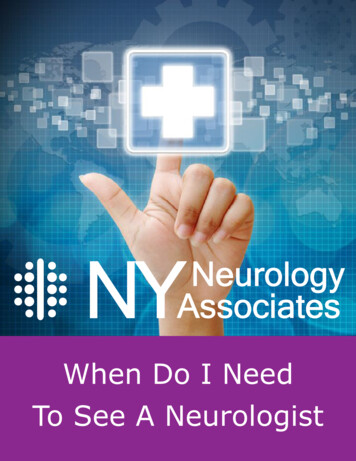
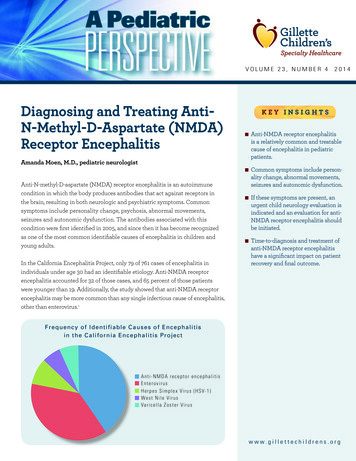
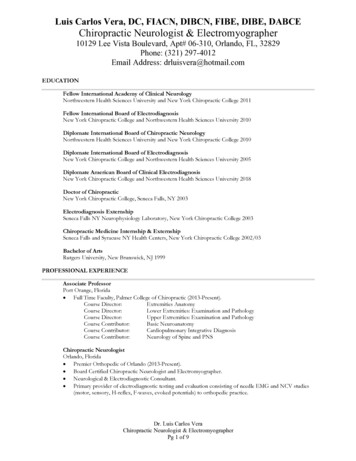
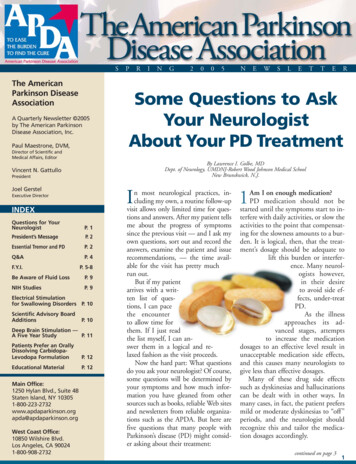
![Medical Training Initiative Post [Paediatric Neurology]](/img/35/cardiff-paediatric-neurology-mti-job-description-for-march-2020.jpg)
